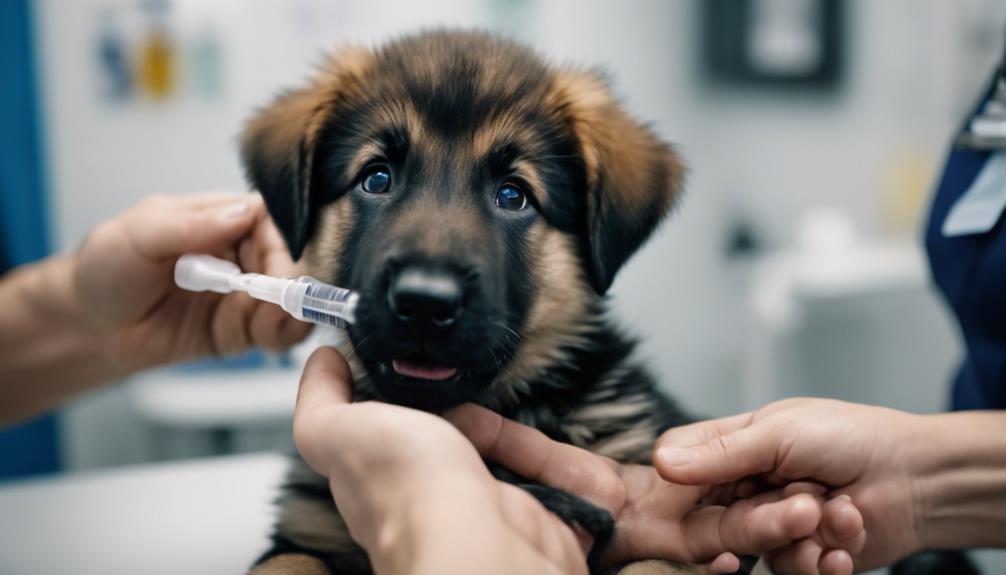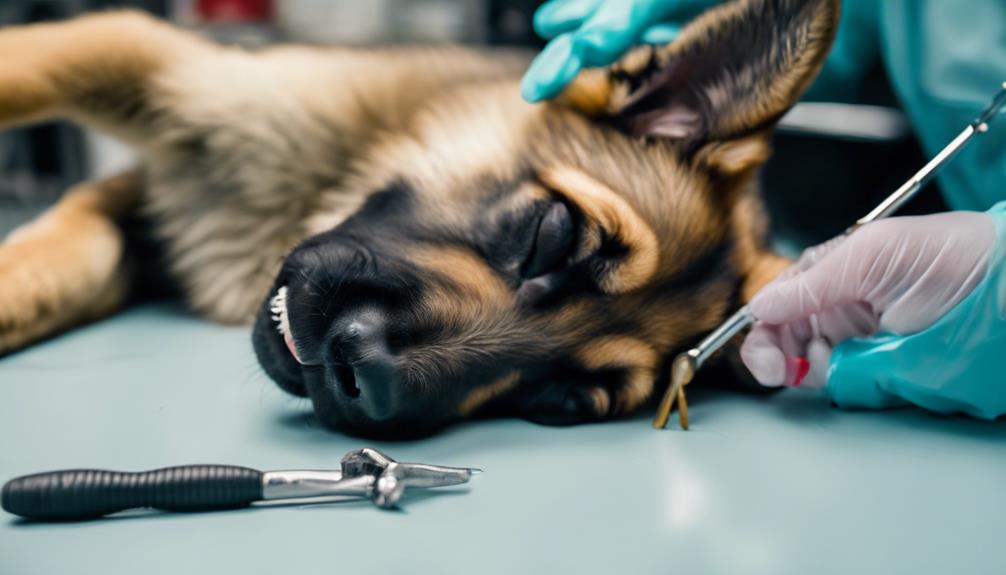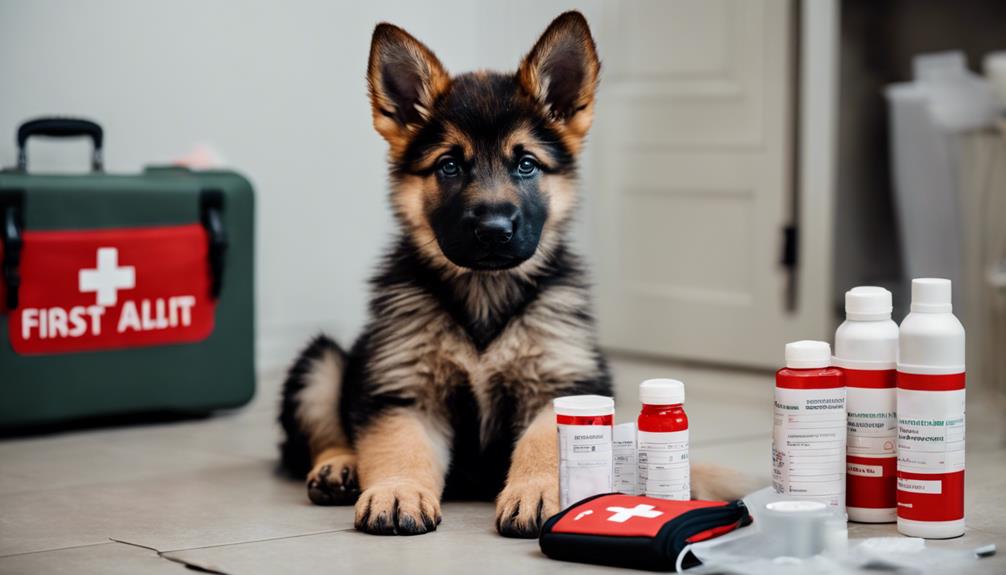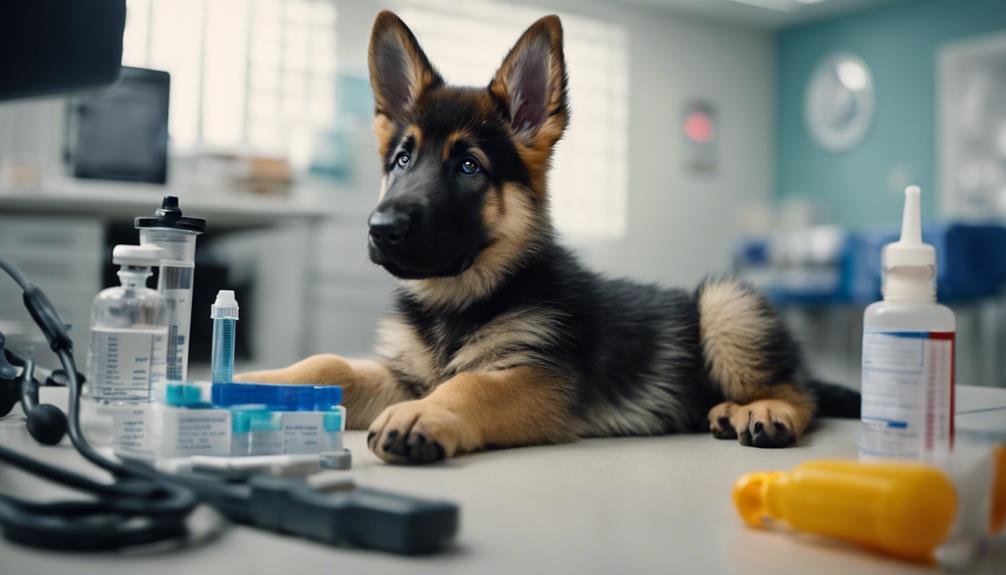🐾 Paw-some Partnership Alert! 🐾
As a pack of German Shepherd enthusiasts at MixGermanShepherd.com, we're always sniffing out the best products for our furry friends. Guess what? When you fetch something from Amazon through our links, we earn a little treat! 🦴
Imagine a vibrant, fluffy German Shepherd mix puppy frolicking in the sun, embodying energy and curiosity. To ensure your furry friend's health and happiness, establishing a comprehensive health check schedule is paramount. From vaccinations to growth monitoring, each step plays a crucial role in their well-being. Stay tuned to uncover the key aspects of maintaining your German Shepherd mix puppy's health, setting a solid foundation for a lifetime of companionship and vitality.
Key Takeaways
- Tailored vaccination schedule for optimal health and disease protection.
- Regular monitoring of growth and development milestones.
- High-quality nutrition, dental care, and weight management.
- Early socialization, training, and preventive healthcare for overall well-being.
Vaccination Schedule for German Shepherd Mix Puppies

When preparing to protect your German Shepherd mix puppy's health, it's crucial to establish a timely and comprehensive vaccination schedule. German Shepherd mix puppies should receive their first set of vaccinations between 6-8 weeks old. These vaccinations typically include core vaccines for distemper, parvovirus, adenovirus, and rabies, which are vital for their overall well-being. Booster shots are necessary and should be given every 3-4 weeks until the puppy reaches around 16 weeks of age to ensure full immunity.
Additionally, vaccination against kennel cough, caused by the Bordetella bronchiseptica bacteria, may be recommended based on your puppy's lifestyle and potential exposure risks. Consulting with a veterinarian is essential to tailor a vaccination schedule specifically suited to your German Shepherd mix puppy's individual needs. Your veterinarian will assess the risk factors involved and provide guidance on the most appropriate vaccinations to keep your puppy healthy and protected.
Common Health Checks for Puppy Wellness

To ensure the overall well-being and optimal health of your German Shepherd mix puppy, it is essential to prioritize regular veterinary visits every 3-4 weeks for vaccinations, deworming, and comprehensive health checks. Here are some common health checks to keep in mind:
- Regular Veterinary Visits: These visits are crucial for tracking your puppy's growth, development, and overall health status.
- Weight Gain Monitoring: Monitoring your puppy's weight gain is important to ensure they are growing at a healthy rate and to detect any potential health issues early on.
- Dental Care: Start early with dental care to prevent future dental problems. Regular teeth cleaning and chew toys can help maintain good oral hygiene.
- Parasite Control: Conduct fecal exams regularly to check for parasites and ensure your puppy's gastrointestinal health.
Preventive Care for Young Mix Breeds

When caring for young mix breeds like your German Shepherd puppy, it's crucial to stick to a regular vaccination schedule tailored to their specific needs. Early socialization is key in ensuring your puppy grows up to be well-adjusted and friendly. Regular vet check-ups will help you catch any potential health issues early on and keep your puppy in top shape.
Vaccination Schedule Importance
Ensuring the timely administration of core and non-core vaccinations is crucial for safeguarding the health of your young German Shepherd mix puppy. Here are some crucial points to consider regarding vaccination schedules:
- Core Vaccinations: Make sure your puppy receives essential vaccines like distemper, parvovirus, and adenovirus to protect against common diseases.
- Non-Core Vaccines: Consider additional vaccines such as those for leptospirosis or kennel cough based on your puppy's lifestyle and risk factors.
- Boosters: Starting vaccinations at 6-8 weeks old and continuing with boosters every 3-4 weeks until 16 weeks helps strengthen your puppy's immune system.
- Tailored Schedule: Following a customized vaccination schedule ensures your puppy's long-term health and well-being, providing them with the necessary protection against preventable illnesses.
Early Socialization Benefits
Implementing early socialization practices is key to fostering optimal behavior and positive interactions in young German Shepherd mix puppies. Socializing your puppy during the critical development stage helps prevent behavioral issues and encourages positive encounters with people and other animals. By introducing your German Shepherd mix to various environments, sounds, and experiences, you can boost their confidence and decrease fearfulness. Early exposure to different stimuli like diverse surfaces and objects contributes to shaping a well-rounded and well-adjusted adult dog. Positive socialization experiences lay the groundwork for a well-behaved and sociable companion, enhancing their overall quality of life.
| Benefits of Early Socialization for German Shepherd Mix Puppies |
|---|
| Prevents behavioral issues |
| Promotes positive interactions |
| Builds confidence and reduces fearfulness |
| Enhances adaptability and reduces aggression risk |
Regular Vet Check-Ups
To ensure the continued well-being of your young German Shepherd mix puppy, initiating regular vet check-ups from as early as 6-8 weeks old is imperative. Here are some key points to consider:
- Vaccinations and Deworming: Discuss with your vet the appropriate schedule for vaccinations and deworming to protect your puppy from common diseases.
- Monitoring Growth: Regular check-ups help track your puppy's growth, weight, and development, ensuring they are on the right track.
- Genetic Condition Screenings: Health screenings for genetic conditions common in German Shepherds should be included in the check-up routine to address any issues early.
- Building a Relationship: Establishing a good relationship with your vet early on can lead to personalized care and proactive management of your puppy's health.
Key Vet Visits for Growing Puppies

When it comes to your German Shepherd mix puppy, key vet visits are crucial for their overall well-being. Make sure to adhere to the vaccination schedule provided by your veterinarian to protect your puppy from common diseases. Additionally, monitoring your puppy's growth, behavior, and overall health will aid in catching any issues early on for timely intervention.
Vaccination Schedule Overview
Start keeping track of your German Shepherd mix puppy's vaccination schedule as early as 6-8 weeks old to safeguard them against common diseases. Here's an overview to guide you through this crucial aspect of your puppy's health:
- Schedule the initial vaccinations at 6-8 weeks to provide protection.
- Administer booster shots every 3-4 weeks until your puppy reaches around 16 weeks for lasting immunity.
- Plan for the rabies vaccination between 12-16 weeks, with a necessary booster in one year.
- Regularly visit the vet during the vaccination schedule to monitor growth, health, and address any concerns promptly.
Following this vaccination schedule diligently supports your German Shepherd mix puppy in staying healthy and thriving.
Growth Monitoring Tips
Once you have established a consistent vaccination schedule for your German Shepherd mix puppy, the next crucial step is actively monitoring their growth and development through key vet visits. Tracking your puppy's growth is essential to ensure they are hitting the appropriate size and weight milestones. Regular vet visits not only include vaccinations and health screenings but also provide an opportunity to discuss any concerns about your puppy's growth with the veterinarian. By monitoring your German Shepherd puppy's growth closely, you can detect any potential health issues early on. Below is a table outlining some general size and weight milestones to keep an eye on during your puppy's growth journey:
| Age (Months) | Average Weight (lbs) | Average Height (inches) |
|---|---|---|
| 2 | 10-20 | 13-15 |
| 4 | 25-35 | 17-19 |
| 6 | 45-55 | 20-22 |
| 12 | 65-85 | 22-26 |
Preventive Health Care
To ensure optimal health for your growing German Shepherd mix puppy, establishing key vet visits for preventive care is essential. Here are the crucial steps to follow:
- Initial Visit (6-8 weeks): Schedule this visit for vaccinations, deworming, and an overall health assessment.
- Follow-up Visits (12 weeks, 16 weeks, 6 months): Attend these appointments for booster shots and health monitoring.
- Spaying/Neutering and Heartworm Prevention: Discuss these options with your vet and start heartworm prevention medication as recommended.
- Regular Dental Check-ups and Flea/Tick Prevention: Ensure to include these discussions during routine vet visits to maintain your puppy's dental health and protect them from parasites.
Establishing a preventive health care plan tailored to your German Shepherd mix puppy's needs is crucial for their well-being.
Monitoring Growth and Development
Monitoring the growth and development of your German Shepherd mix puppy is crucial for ensuring their overall health and well-being. Regularly monitor your puppy's weight gain and growth milestones on a weekly basis to track their healthy development. Keep a record of height measurements to identify any sudden growth spurts or abnormalities that may arise. It's essential to also take note of important developmental milestones such as teething, eye and ear opening, and walking progress.
Compare your puppy's growth patterns with the breed standards set for German Shepherd Dogs to assess their progress accurately. If you have any concerns or questions regarding your puppy's growth and development, don't hesitate to consult with a veterinarian for professional guidance. They can provide valuable insights on growth, nutrition, and the overall health of your German Shepherd mix puppy, ensuring they are on the right track towards a healthy and happy life.
Recommended Diet and Nutrition Plan

For optimal growth and development, a balanced diet rich in protein and nutrients is crucial for your German Shepherd mix puppy. Here are some essential guidelines to ensure your puppy receives the proper nutrition:
- Choose High-Quality Puppy Food: Opt for a high-quality puppy food specifically formulated for large breeds like German Shepherds. These foods contain the right balance of nutrients to support your puppy's growth.
- Prevent Overfeeding: Avoid overfeeding your puppy as excess weight can lead to health issues, especially in large breeds. Follow the recommended portion sizes and feeding guidelines provided on the food packaging.
- Consult with a Veterinarian: Seek advice from a veterinarian to establish a feeding schedule tailored to your puppy's specific needs based on factors like age, weight, and activity level.
- Monitor Weight and Body Condition: Regularly monitor your German Shepherd mix puppy's weight and body condition. Adjust their diet as needed to ensure they are growing at a healthy rate.
Dental Care for Puppy Teeth

When ensuring the overall health of your German Shepherd mix puppy, it's important to pay attention to their dental care, starting with proper maintenance of their puppy teeth. Puppy teeth typically start coming in around 3-4 weeks of age and will fall out between 14-30 weeks. Regular brushing with a puppy toothbrush and toothpaste is crucial to prevent plaque buildup and maintain oral hygiene. Additionally, chewing on appropriate toys and treats can aid in the teething process and promote good dental health. Remember to avoid using human toothpaste and products containing xylitol, as they can be toxic to dogs.
To ensure your puppy's dental health is on track, schedule regular vet check-ups. Your veterinarian can monitor the development of your puppy's teeth and address any potential issues early on. By staying proactive with dental care, you can help your German Shepherd mix puppy maintain healthy teeth and gums for a lifetime of good oral health.
Socialization and Training Tips

To foster positive behavior and confidence in your German Shepherd mix puppy, prioritize early socialization and consistent training methods. Here are some essential tips to help you in training and socializing your puppy effectively:
- Start Early: Begin socializing your puppy as soon as you bring them home. Introduce them to various people, animals, and environments to build their confidence.
- Use Positive Reinforcement: Reward good behavior with treats, praise, or toys. Positive reinforcement encourages your puppy to repeat desirable actions.
- Consistent Training: Establish clear rules and boundaries from the start. Consistency in training methods helps your puppy understand what is expected of them.
- Obedience Classes: Consider enrolling your puppy in obedience classes. These structured programs provide valuable training opportunities and help strengthen the bond between you and your furry companion.
Emergency Preparedness for Puppy Owners

Prioritize your German Shepherd mix puppy's safety and well-being by being prepared for emergencies through essential measures. Start by assembling a first aid kit with supplies like bandages, antiseptic, and gauze pads. Ensure you know the location of the nearest 24-hour veterinary clinic in case of emergencies. Additionally, create a list of emergency contacts that includes your veterinarian's number and the contact information for a local animal poison control center for quick access during urgent situations. Familiarize yourself with common toxins and hazards in your home that could harm your German Shepherd mix puppy. Develop an evacuation plan for natural disasters or emergencies to guarantee your puppy's safety and well-being. By taking these steps, you can be better equipped to handle unexpected situations and provide immediate care for your beloved furry companion.
Frequently Asked Questions
What Are the Recommended Health Tests for German Shepherds?
To keep your German Shepherd healthy, recommended health tests include hip and elbow dysplasia screening, genetic testing for hereditary conditions, cardiac evaluations, eye exams, and thyroid function tests. Regular exams can help ensure your pup's well-being.
What Are the Health Clearances for German Shepherds?
To ensure the well-being of your German Shepherd, prioritize health clearances like hip and elbow evaluations for dysplasia, genetic testing for hereditary conditions, eye exams for issues like PRA, and cardiac assessments. These tests safeguard your dog's health for breeding or activities.
How Often Should I Take My German Shepherd to the Vet?
You should take your German Shepherd to the vet every 3-4 weeks until 16 weeks old, then annually. These visits are crucial for monitoring growth, development, and addressing health concerns promptly. Regular check-ups ensure preventive care for a healthy pup.
How Often Should I Bathe My German Shepherd Mix?
For your German Shepherd mix, grooming tips are crucial. To maintain coat health, balance bathing every 2-3 months with regular brushing. Avoid over-bathing to prevent skin issues. Consult experts for shedding solutions and personalized care advice.
Conclusion
Ensure your German Shepherd mix puppy stays healthy and happy by following a consistent health check schedule. From vaccinations to dental care, monitoring growth to emergency preparedness, staying proactive is paramount. Remember, proper preventive care and regular vet visits are key to your puppy's well-being. Stay on top of their health needs with a well-rounded approach for a thriving, tail-wagging companion.
